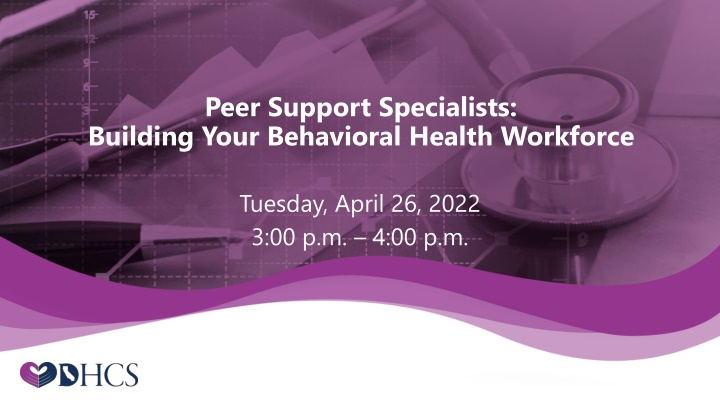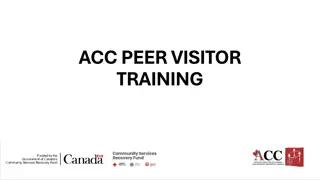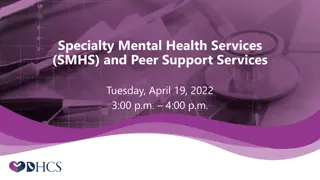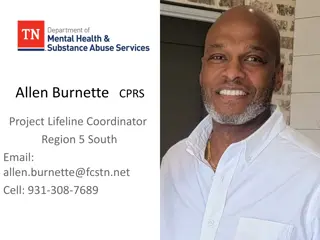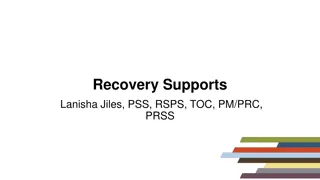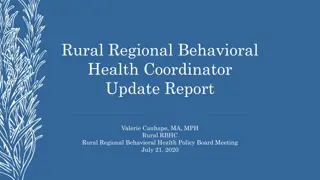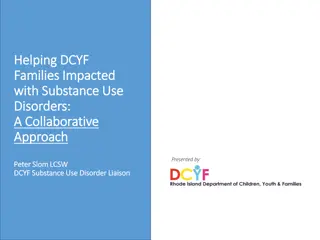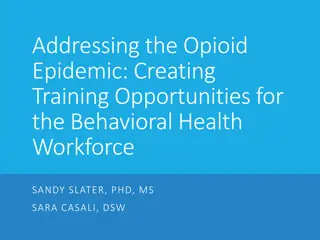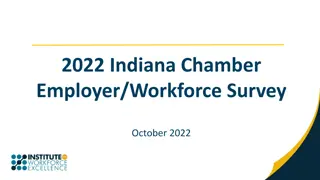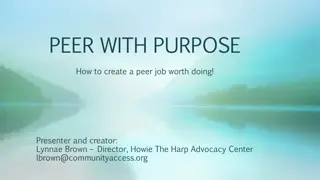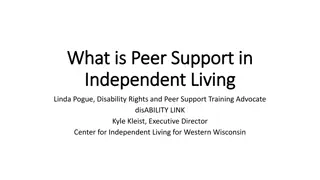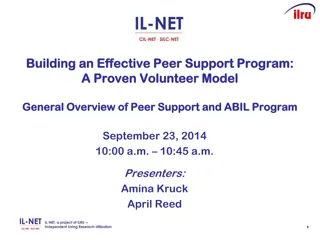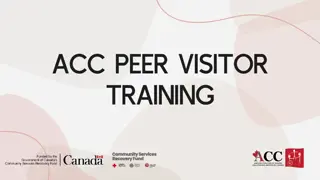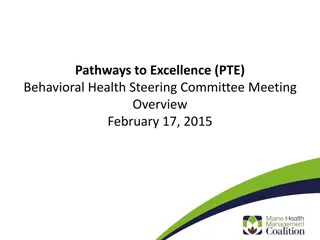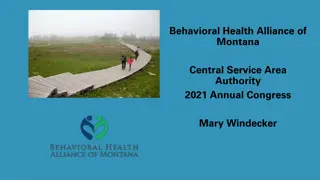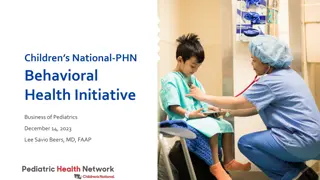Peer Support Specialists: Building a Strong Behavioral Health Workforce
Learn about the crucial role of peer support specialists in the recovery process and how they help individuals stay engaged and prevent relapse. Discover opportunities to become a DHCS Coverage Ambassador to support beneficiaries during the transition period post COVID-19 PHE. Gain insights from featured presenters on integrating peer support specialists into the behavioral health workforce effectively.
Download Presentation

Please find below an Image/Link to download the presentation.
The content on the website is provided AS IS for your information and personal use only. It may not be sold, licensed, or shared on other websites without obtaining consent from the author.If you encounter any issues during the download, it is possible that the publisher has removed the file from their server.
You are allowed to download the files provided on this website for personal or commercial use, subject to the condition that they are used lawfully. All files are the property of their respective owners.
The content on the website is provided AS IS for your information and personal use only. It may not be sold, licensed, or shared on other websites without obtaining consent from the author.
E N D
Presentation Transcript
Peer Support Specialists: Building Your Behavioral Health Workforce Tuesday, April 26, 2022 3:00 p.m. 4:00 p.m.
Public Health Emergency (PHE) Unwinding The COVID-19 PHE will end soon and millions of Medi-Cal beneficiaries may lose their coverage. Top Goal of DHCS: Minimize beneficiary burden and promote continuity of coverage for our beneficiaries. How you can help: Become a DHCS Coverage Ambassador Download the Outreach Toolkit on the DHCS Coverage Ambassador webpage Join the DHCS Coverage Ambassador mailing list to receive updated toolkits as they become available 2
DHCS PHE Unwind Communications Strategy Phase One: Encourage Beneficiaries to Update Contact Information Launch immediately Multi-channel communication campaign to encourage beneficiaries to update contact information with county offices. Flyers in provider/clinic offices, social media, call scripts, website banners Phase Two: Watch for Renewal Packets in the mail. Remember to update your contact information! Launch 60 days prior to COVID-19 PHE termination. Remind beneficiaries to watch for renewal packets in the mail and update contact information with county office if they have not done so yet. 3
Featured Presenters Ali Marzolf, Senior Policy Consultant, Integrated Care, Aurrera Health Group Shannon McCleerey-Hooper, Peer Support Oversight Administrator, Riverside University Health System-Behavioral Health Jason Robison, Chief Program Officer, SHARE! (Self-Help And Recovery Exchange)
Agenda Introduction to the Medi-Cal Peer Support Services Benefit Peer Workforce Considerations Integrating Peer Support Specialists into Your Behavioral Health Workforce Questions
Introduction to the Medi-Cal Peer Support Services Benefit Ali Marzolf, Senior Policy Consultant Integrated Care, Aurrera Health Group
Who are peers? Peer support specialists are people who have been successful in the recovery process who help others experiencing similar situations. Through shared understanding, respect, and mutual empowerment, peer support specialists help people become and stay engaged in the recovery process and reduce the likelihood of relapse.
Senate Bill 803 Senate Bill 803 (SB 803) (Beall, Chapter 150, Statutes of 2020) authorized DHCS to add peer support specialists as a Medi-Cal provider type and peer support services as a Medi-Cal benefit. Effective July 1, 2022, peer support specialist services will be an optional behavioral health Medi-Cal benefit in California.
Peer Support Specialists Outside of Medi-Cal SB 803 does not impact peer programs under other funding sources. Counties may continue to provide peer services through other funding streams. BHIN 20-056 identifies the range of funding sources for peer support specialists that are available outside of the Medi-Cal program. Examples of other funding streams: Private health insurance Grants Self-pay
Roles in the Medi-Cal Peer Support Specialist Services Benefit Department of Health Care Services: Establish statewide standards for peer certification and monitor certifying organizations and counties. County: Implement the Medi-Cal benefit, and either develop or choose a certification program. Certification program: Certify peer support specialists for Medi-Cal reimbursement. Peers: Provide peer support services to Medi-Cal beneficiaries.
County Role in Medi-Cal Peer Support Specialist Services Each county may decide whether to opt into this benefit. Counties are responsible for implementing the Medi-Cal peer support specialist services benefit. Interested peers and peer-run organizations should work with their county Behavioral Health Department to bill Medi-Cal for peer support specialist services.
Certification Programs for Medi-Cal Peer Support Specialists To receive Medi-Cal reimbursement, peer support specialists must become certified as a Medi-Cal Peer Support Specialist in California. Counties are responsible for implementing certification programs. Counties may implement their own certification program or select an entity to provide a certification program for their county.
Certification Program (continued) A county may only elect one certification entity at a time. For more information on this, reference Behavioral Health Information Notice 22- 006, which addresses county requirements for new and updated certification entities. As of FY 2022-2023 CalMHSA is the certification entity implementing the Medi-Cal Peer Support Specialist Certification Program. More information about the CalMHSA Medi-Cal Peer Support Specialist Certification Program can be found online: https://www.calmhsa.org/peer-certification/ DHCS will host a separate Technical Assistance webinar on developing certification programs in Fall 2022.
Benefit Description Peer Support Services: Are culturally competent individual and group services that promote recovery, resiliency, engagement, socialization, self-sufficiency, self-advocacy, development of natural supports, and identification of strengths through structured activities such as group and individual coaching to set recovery goals and identify steps to reach the goals. Services aim to prevent relapse, empower beneficiaries through strength-based coaching, support linkages to community resources, and to educate beneficiaries and their families about their conditions and the process of recovery. May be provided with the beneficiary or significant support person(s) and may be provided in a clinical or non-clinical setting. Can include contact with family members or other collaterals if the purpose of the collateral s participation is to focus on the treatment needs of the beneficiary by supporting the achievement of the beneficiary's treatment goals. Source: California State Plan Amendment 21-0058
Benefit Description (continued) Peer support services are based on an approved plan of care and can be delivered as a standalone service. Peer support services include the following service components: Educational Skill Building Groups Engagement Therapeutic Activity Source: California State Plan Amendment 21-0058
Peer Workforce Considerations Shannon McCleerey-Hooper, Peer Support Oversight Administrator, Riverside University Health System-Behavioral Health
County Direct-Employed Peer Support Specialists Create supportive infrastructure Peer support specialist leadership Human Resources job specifications Self-disclosure as an expectation and job function Interview questions What makes you uniquely qualified? Hire for recovery Based on the person s ability to role-model Advanced level degrees Irrelevant when hiring peer line staff Give a leg up to volunteers and interns
Community Based Organization (CBO)-Employed Peer Support Specialists Recommendations for counties contracting with CBOs Create supportive pathways for CBOs Network and communicate Invite CBOs to the table: Behavioral health boards Stakeholder meetings Other relevant events
Integrating Peer Support Specialists Into Your Behavioral Health Workforce Jason Robison, Chief Program Officer, SHARE! (Self-Help And Recovery Exchange)
Building Blocks for Effective Scaling Recruitment Recruit people who want to do this job Recruit from the community of recovery (Self-Help Support Groups) Recruit people already in the workforce Recruit through intersectionality Hiring Hiring process should have a mechanism to demonstrate competence Ensure role clarity within organization/agency Well-defined responsibilities and tasks Job descriptions based on evidence-based peer practices
Building Blocks for Effective Scaling Training In addition to Medi-Cal Peer Certification training, include training based on role in organization and organization practices Opportunities for career advancement Supervising Ensure role clarity within organization/agency Well-defined responsibilities and tasks Job descriptions based on evidence-based peer practices Continuous training and management actions that reinforce the importance of Peer Support Services for the best outcomes for the people being served
Best Practices: Recruitment Do make sure to have clear job descriptions that have peer support workers doing evidence-based peer services rather than assisting clinicians Do identify job posting networks that will reach appropriate Peer Support Specialist (PSS) applicants, such as posting job openings at community centers that offer self-help support groups Do not exclude people with lived experience solely for having a criminal record Do not exclude people because of gaps in their r sum s as it can take many years to get stabilized when experiencing behavioral health symptoms. Until recently, many behavioral health consumers were discouraged from working.
Best Practices: Hiring Do familiarize interviewers with Medi-Cal PSS core competencies, so they can ask questions that evaluate applicants relevant knowledge and skills Do hire people with lived experience who have at least one year of attendance in 12-Step, Recovery International, or other self-help support Do hire Medi-Cal PSS in recovery who have previously dealt with difficult life experiences and serious behavioral health issues Do hire trained PSS who can demonstrate their competence in, and experience with, evidence-based Peer Support Services, or arrange for new PSS to receive training in evidence-based Peer Support Services, such as the SHARE! Advanced Peer Specialist Training
Best Practices: Training Do address boundary issues in the workplace pertaining to an employee s recovery services Do arrange for new peer workers to have mentors Do utilize PSS to train and supervise other PSS (when possible) Do orient all employees to the PSS role
Best Practices: Work Environment Do communicate to all staff a clear vision of the peer role and a specific implementation plan to support the practice of peer support Do have an agency plan to integrate PSSs into all aspects of agency work, including addressing agency and staff stigma, and micro-aggressions Do make sure supervisors are practicing collaborative supervision, ex. the Trauma-informed Developmental Model and data-informed plans of action Do create opportunities for career advancement in Peer Support Services
Best Practices: Work Environment (continued) Do train all staff on the importance of peer roles, including providing effective anti- stigma and anti-discrimination materials and approaches Emphasize the value of peer workers and promotion of a non-stigmatizing environment Point out that peer worker boundaries and ethics are different than professional boundaries Do give employees opportunities to gain further knowledge about PSS roles and responsibilities Do engage in agency-wide trust-building with an emphasis on good communication, high recovery orientation, trainings on stigma, being an ally, dealing effectively with discrimination and bias in the workplace Do use a clearly-defined scope of work for all employees
Best Practices: Work Environment (continued) Do include PSS in brainstorming and decision-making Do value PSS input at all levels, ex. listening to peer input without discounting it Do implement a plan for PSS and all workers continuing education Do eliminate othering language and practices, ex. using derogatory language for clients when clients are not present, separate restrooms for clients, etc. Do support the supervisors of PSS, so they are not marginalized or treated as having a less important job because they are supervising peer workers
Best Practices: Supporting Peer Support Specialists Do constructively address co-workers who feel threatened by or competitive with Peer Support Specialists or do not see the value of Peer Support Services Do provide adequate, competitive compensation and access to benefits for Peer Support Specialists Do assure that Peer Support Specialists receive ongoing training both to refresh skills and knowledge, as well as to be informed about new developments in the Peer Support Services field Do encourage Peer Support Specialists and other staff to attend self-help support groups to build resilience and mitigate burnout
Best Practices: Final Thoughts Do require managers and administrators overseeing peer programs to attend a self-help support group relevant to their own issues at least six times to develop competency in understanding the nature of peer relationships. Self-help support groups directly relevant to the work include Recovery International and Co-Dependents Anonymous Do create a coalition of peer supervisors from multiple agencies to provide support to one another Do utilize training materials for existing employees about organizational structure, organizational culture, and how change occurs
Questions Please submit your questions through the GoToWebinar portal. Questions after the presentation regarding the peers benefit may be submitted to your County Support Liaison.
